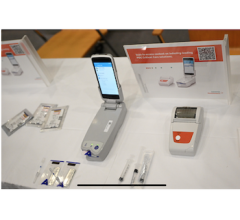August 6, 2008 - Toshiba America Medical Systems Inc. delivered the first Aplio Artida ultrasound system to Iowa Heart Center in Des Moines.
“Being the first to purchase the Aplio Artida is an exciting development for us and our patients,” said Dr. Richard Marcus, director of cardiovascular ultrasound laboratory, Iowa Heart Center. “Having first-hand experience with the system, I am pleased with the images it produces. Its enhanced applications, particularly the 4D imaging, will allow our facility to continue to improve the care provided to our patients.”
Dr. Marcus said the Iowa Heart Center selected the Aplio Artida for the system’s impressive 4D imaging capability and 3D wall motion tracking.
Toshiba said Artida’s real-time, multi-planar reformatting capabilities enable physicians to quantify global and regional LV function, including volumetric LV ejection fraction. Arbitrary views of the heart not available in 2D imaging are also obtained that can help with surgical planning.
The Artida is the first ultrasound system in the world with the ability to track and display myocardial motion and 3D volumes in 3D images. 2D/3D wall motion tracking features allow the user to obtain angle-independent, quantitative and regional information about myocardial contraction. The company said it hopes these features will enable acquisition of additional data that could be of value in echo-guided cardiac resynchronization therapy (CRT) and in stress echocardiography.
Artida includes additional features that enhance diagnostic capabilities, including multiple processors that run synchronously which allow for handling of large amounts of data. The manufacturer also said the device’s multiple processor design brings echocardiography to a new level of imaging performance and clarity. It employs the distributed processing power of more than 80 processor cores interconnected by a fast digital system interface. In fact, the company said the engine can process an amount of data equal to a fully loaded DVD every single second.
The Artida’s MultiCast Beamformer uses advanced digital signal processing to control the shape of the ultrasound beam more precisely and flexibly than in comparable systems. Improvements include a simultaneous multiple transmit focus or a doubled frame rate in color Doppler mode to help expedite exams while improving diagnostic accuracy, Toshiba said.
A variety of prospective and retrospective volume acquisition modes also provide the flexibility to easily acquire and store 4D volumes as raw data, the company said. The easy-to-use volume navigation is delay-free and enables fast and accurate surfing of the volumes at any time, either on the system or off-line. The Artida’s intuitive SmartSlice functions allow physicians to cut, slice and position the 4D volume quickly.
For more information: www.iowaheart.com, www.medical.toshiba.com.


 February 16, 2026
February 16, 2026 









